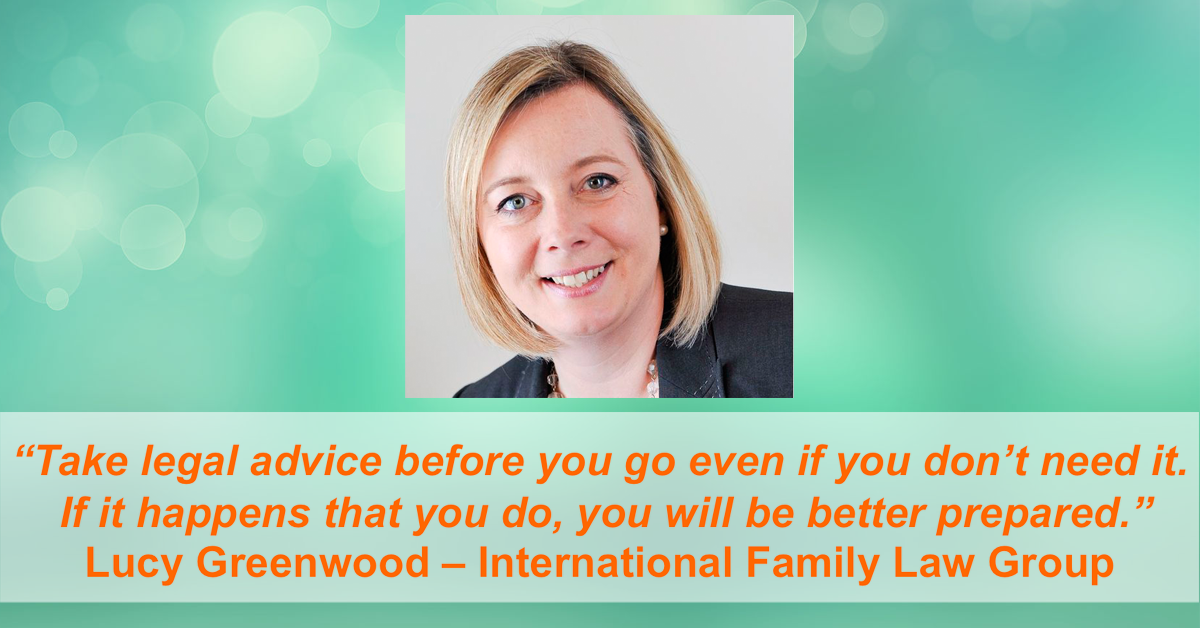The elephant in the room, expat divorce.

Oulala, Nomad Nation, you are not going to like this...
Nobody likes to talk of the possibility of divorce whether being happily married or not, and even less when living abroad and being a "dependent spouse"!
But here is the thing; most of us have a car, home or life insurance. Does it mean that we expect or want to have a major car accident, a home burning down or a family member passing away?
If we get insured for these dramatic and unpredictable life incidents, why wouldn't we at least get informed about our rights and obligations in case of divorce , especially when having kids and living abroad?
You will discover in this article, that the expression "better safe than sorry" does really apply to this situation! (Tweet this!)
To discuss this important topic, I reached out to an expert on the matter, Lucy Greenwood, lawyer and partner at the International Family Law Group, she kindly accepted to share her expertise with us and some guidance to prevent some worst case scenarios. I am very thankful to her, as she managed to explain very complex legal aspects in a very clear and simple way. You can listen to the full interview on Tandem Nomads podcast episode #38 (click here to listen).
Although we did discuss the financial aspect of divorce, because it is such a complex topic, I decided to particularly focus on the issues regarding children custody when living abroad. Indeed, I believe it must be one of the most difficult technical and emotional aspects of divorce for parents and children, especially when living abroad.
Why is it such a big deal? What should we know when living abroad?
There are a lot of aspects of international civil law that I am sure a lot of expat families are not aware of and that can affect their lives dramatically in case of divorce.
When I discovered some extreme cases of expat parents not being able to go back home with their children (www.expatstuckparent.org), or others not being granted a visa to visit their children, I really had to find out more about it.
The Hague Convention and 4 important aspects to know:
In fact, one of the many discoveries that caught my attention regarding expat families’ breakdown is the existence of the Hague Convention that regulates international civil and commercial matters among the 80 member countries (click to check if yours are). There are probably many positive and negative aspects about this convention, and all debatable.
If we try to stay factual, there are at least four very important aspects that I think expat couples must know when they move abroad, and some of them are closely related to the Hague Convention:
1. The country jurisdictions and timing have an impact on divorce outcomes.
The competent jurisdictions for marriages and divorces are not only the ones from the home country or the country were the couple got married. As Lucy pointed out, it actually happens that each spouse files a court case in a different country. This can lead to a lot of legal complications and tremendous costs, not to mention the emotional distress that can go with it.
2. Spouses can lose the right to stay in the foreign country when divorcing.
Spouses residing in a foreign country with a "dependent spouse visa" often have to go back to their "passport country", a country where sometimes they haven't lived for decades. Some of them have also been financially dependent for years and become very vulnerable as they face challenges going back to the labor market. Also, getting a new type of visa or residence permit in the country where their children have to stay can be very complicated if they do not have a job or a sponsor in that country.
3. Children's "legal home" is not necessary their "passport country". (tweet this!)
In case of non-agreement on child custody, the Hague Convention tends to be in favor of the parent living where the children are residing during the facts or where they lived the longest, which doesn't necessary mean back to their "passport country", where the "dependent spouse" has often to go back.
4. Taking the children back "home" with no explicit authorization can lead to serious charges under international law. (tweet this!)
If spouses leave the country with their children without the explicit authorization (an even then!) of the other parent, they can fall under the serious charges of child abduction, sometimes without even realizing it!
When we started our conversation, Lucy rightly pointed out that it is not always as gloomy and extreme as that. However, she did insist on the importance of getting informed before leaving abroad. This is why I believe it is important to know that these situations exist and how we can prevent them from happening.
How to prevent things from getting ugly ?
In fact, not being informed before the matter of divorce comes up, or not being able to react fast enough when a divorce case is filed, are often the biggest part of the problem.
Lucy did a great job explaining very clearly the different complex cases that can happen to expat couples abroad, so I highly recommend you to listen to the complete interview and be aware of these different situations that may concern you (click to listen).
However, here are some interesting and important take-aways that Lucy Greenwood shared with us to avoid worst case scenarios:
- Seek legal advice before you move abroad (not too late if you already moved though!), even if your relationship is doing great. If your relationship stays strong, then great! If things get complicated, at least you will be prepared to react on time and know your rights and obligations. (Tweet this!)
- Have some kind of agreement with your partner before you move abroad; a pre-nuptial agreement can be a good idea. Most importantly, if you have children, ask yourself what you would do in case of divorce and what you would explicitly be able to agree on. It is important to know that official written agreements are not always applicable and their application varies from a country to another. However, it is always better to have some kind of written agreement that protects your rights and your wishes while living abroad (If things evolve for you, make the agreement with your partner evolve too!).
- If you seriously start thinking of divorce, do not mention divorce to your spouse until you have seen an attorney. You may discuss your relationship difficulties and how to solve them, but not the legal aspects. In the interview, Lucy explains in detail why it might cause you harm if you don't speak to an attorney first.
I think we have now covered some of the major things to know about the legal aspects of expat family breakdown! Although we can never be 100% prepared for anything like that, it is important to be aware of these aspects and consequences before the matter of divorce comes up in the relationship.
I am pretty sure (or at least I hope!) that you are by now convinced that it is a topic that should not be taboo and should be prepared to assure the best possible outcome in case of divorce.
If I had to add or insist on one more argument: it is the children's well-being and emotional development! Family breakdown and divorce can be very stressful and emotionally challenging for everyone, but particularly for children who often end up caught in the middle of adult disputes. The more prepared, the faster a good agreement for both parties can be reached, the better for the psychological and emotional impact on the children.
Also, although we have only briefly discussed the financial aspect for expat spouses, who often give up their successful careers to follow their partners abroad and take care of the family, it is important to be aware of how vulnerable they can become after a divorce. Besides children custody, this financial aspect should really be prepared and thought through when embarking on a nomadic tandem!
In order to prepare the administrative and technical aspects, making sure to not fall into the trap of one day "waking up with nothing", or making sure to have a minimum of security if unexpected life events happen while living abroad, I highly recommend you to check out Rachel Yates Expat Lifeline program. She has some great content and trainings to help you build a solid safety net for you, but also for your whole family!
And of course, to build your own fulfillment, source of revenue and find guidance to build a portable career, keep listening to Tandem Nomads podcast episodes and spread the word with your expat friends! There is some great stuff coming up in the following months to provide you with all the knowledge and tools you need to build a successful portable business.
STAY TUNED!!!

